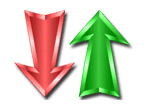August New Car Sales Fall in Europe Rise in Asia
 |
BEIJING/PARIS - September 1, 2010: Fang Yan and Helen Massy-Beresford writing for Reuters reported that Asian auto sales soared in August, boosted by government incentives although U.S. economic uncertainty and slowing growth in China look set to curb demand, while in Europe car sales fell as scrapping bonuses ran out.
French and Spanish car sales fell in August, as scrapping incentives are fading or have run out in those markets. Italian and Belgian car sales figures are due out later.
In China, the world's biggest auto market, passenger car sales jumped almost 60 percent for the month, a sharp improvement from the sales rise seen in July.
But runaway growth has been tapering in the world's number two economy since the second quarter as the government hits the brakes to stop the economy overheating, and executives are cautious about the outlook for the rest of the year.
South Korean automaker Hyundai Motor Co posted double-digit sales growth aided by new car launches, but it faces uncertainty after U.S. officials launched a safety investigation over its best selling car in America, the Sonata sedan.
"Overall sales growth in the United States is already slowing down and consumers who only need to replace their aged models are buying," said Kevin Lee, an analyst at Shinhan Investment in Seoul.
"Weak demand in China is also a concern and it could last until the first half of next year but it's a long-term growth market anyway and investors won't be much concerned about short-term volatility in China."
China's car sales rose to 977,300 in August, according to the government-affiliated China Automotive Technology & Research Center. That compared to the 15.4 percent rise reported in July.
Still, growth was slower than in the first few months of the year when monthly auto sales topped the 1 million units mark.
Sales at India's top three local automakers, Maruti Suzuki (MRTI.BO), Mahindra & Mahindra and Tata Motors rose between a quarter and a third.
India is one of the fastest growing automobile markets in the world, growing at 35 percent on average in the first four months of the current fiscal year, data from the Society of Indian Automobile Manufacturers (SIAM) showed.
That momentum is not expected to last. SIAM has forecast car sales to grow 12 percent to 13 percent in the year ending March 2011, an estimate analysts see as conservative.
EUROPEAN MARKETS FALL
In France, home to PSA Peugeot Citroen (PEUP.PA) and Renault (RENA.PA), passenger car sales fell 9.8 percent in August.
"The French market is returning to where it was before the effect of the scrapping incentive scheme," said a spokesman for industry association CCFA.
"We're back to a level similar to that of August 2009... we should end the year at over 2 million vehicles," he added.
Flavien Neuvy, head of the automobile industry research unit at French consumer credit organisation Cetelem, agreed.
"There is no longer a scrapping effect. There is still a scrapping incentive (of 500 euros until the end of the year) but evidently it is no longer much use," he said.
Car sales will continue to show year-on-year falls in France in the coming months, Neuvy said as sales figures compare to very strong months in late 2009, when consumers flocked to take advantage of the thousand euro bonus before it was reduced.
"We will see significant dips," Neuvy said.
Light commercial vehicle sales rose 8.5 percent in August, reflecting an upturn in demand from industrial sectors like public infrastructure and construction, the spokesman added.
In Spain, industry body ANFAC said car sales fell 23.8 percent in August to 44,578 units from 58,509 a year earlier.
Government subsidies to help people buy new cars ran out at the start of July, at the same time as a hike in value-added tax kicked in.
JAPAN SCRAPPING BOOST
Auto sales in Japan saw their third-biggest ever monthly rise in August, led by Toyota Motor, Honda Motor and others, as consumers bought before government subsidies expire at end-September.
Japanese automakers are bracing for a hard landing after subsidies disappear. The government has allocated 583.7 billion yen ($6.9 billion) for the initiative, which took effect in April 2009, and that pool looks set to run dry in less than two weeks at the current pace of registration.
"We can't tell how big the impact (of the end of subsidies) will be," said Michiro Saito, manager at the Japan Automobile Dealers Association. "We'll have to see what kind of marketing plans automakers come up with."
Sales of new cars, trucks and buses in Japan soared 46.7 percent to 290,789 vehicles, marking the third-biggest monthly rise on record, the Japan Automobile Dealers Association said.
Including 660cc minivehicles, sales rose 37.7 percent to 424,986 units.
JP Morgan auto analyst Kohei Takahashi said Japanese auto production will trend lower as the impact of subsidies wanes and as automakers opt to produce more cars overseas to limit the impact of a stronger yen.
Additional reporting for Reuters by Chang-Ran Kim in TOKYO, Miyoung Kim and Hyunjoo Jin in SEOUL, Sonya Dowsett in MADRID and Bharghavi Nagaraju in BANGALORE; Writing by Muralikumar Anantharaman; Editing by Anshuman Daga and Mike Nesbit


